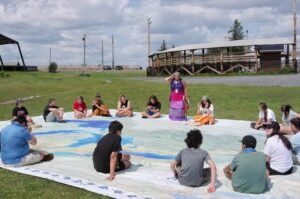The Aki Kikinomakaywin: Learning on the Land STEAM program a hit amongst Indigenous youth

By Rick Garrick
THUNDER BAY — The Aki Kikinomakaywin: Learning on the Land STEAM (Science, Technology, Engineering, Arts, and Mathematics) program was a hit with a group of 17 Indigenous youth during activities in Thunder Bay and Fort William. The week-long camp, based at Lakehead University’s Thunder Bay campus from July 16-22, included a visit to Anemki Wajiw, a Water Walk along the McIntyre River, a day at the School of Indigenous Learning (SOIL), a Stream Assessment activity featuring water testing and benthic macroinvertebrates collection, classification and ID on the McIntyre River, art sessions with Indigenous artists Shelby Gagnon and Betty Carpick, a visit to the Thunder Bay Art Gallery, and outings to Sandy Beach and Boulevard Lake.
“Today, when I was going through the Water Walk, we all put our tobacco down and got prepared for the ceremony,” says Michelle Jones, mother of one of the participants and Garden River citizen. “The kids were so quiet and they took pride in what they were doing.”
Jones says she personally went through an experience during the Water Walk that was “a reflection of what happened to our people.”
“My son kind of steered off in his own little way,” Jones says. “We were behind and when that happened, it really hit me hard. I had my own reflection — I could see what happened to us as Anishinabek people when the Sixties Scoop [happened], the ones that got left behind. So much emotions were going through me and I think that was the healing of the water because when we pray for the water, the water prays for us or heals us. I could just imagine someone trying to catch up to go back to their community, someone left out, someone being tired and not knowing where to go.”
Fort William Elder Sheila DeCorte, who led the Water Walk along with Wiikwemkoong’s Sharon Manitowabi, says a couple of the young women helped prepare the feast dish offerings.
“One of them went with Sharon to go and do the offering the night before and then two other ones did the offerings this morning when we picked up the water,” Elder DeCorte says. “And then one of them did the offering at the end of the walk.”
DeCorte also shared some teachings during the Aki Kikinomakaywin program, including information about Anemki Wajiw and Loch Lomond.
“It’s important to share those teachings with them to help guide them in a good way, introduce them to the culture and hopefully one day get interest and wake up that cultural spirit within them so that they’ll continue to want to learn,” DeCorte says. “My niece came this year — this is her first time experiencing culture and it was nice to be able to do that with her. We actually did an interview together, I interviewed her and asked her questions for the Canadian Geographic and she blew me away, she actually introduced herself in the language and answered my questions.”
Jeordi Pierre, owner/operator at SOIL and Fort William citizen, says he emphasized how the Anishinabek culture is about preservation of land and taking care of the water during the Aki Kikinomakaywin visit.
“I think it’s really important that our youth get on board with that because they have some great challenges ahead of them,” Pierre says. “You can see the way the land is responding to take, take, take. I just gave them some awareness about preservation of the land but also the way of the Anishinabek people being stewards of the land and taking care of it properly.”
Lydia Johnson, project lead at Aki Kikinomakaywin, enjoyed seeing the growth of the youth during the Aki Kikinomakaywin program.
“Every single day we tried to root the day in some form of being on the land or being on the water,” Johnson says. “It’s just been so important to root all of our days in the traditional stories and teachings around water and around land and respect. We can be on the land and we can think about things not just from a more Western or colonial point of view — we can go to the water and sample the water but we can also give tobacco and we can also sing a water song and introduce ourselves.”


